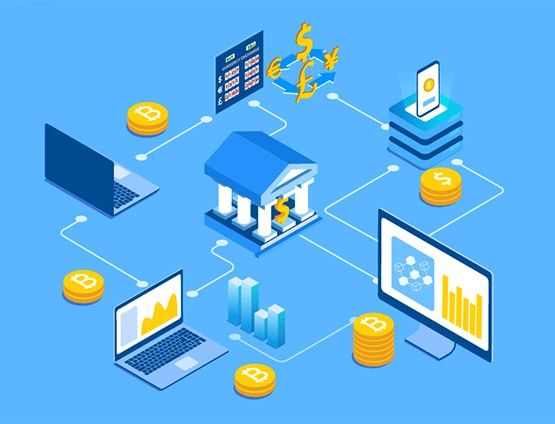Decentralized Finance, commonly referred to as DeFi, is a revolutionary financial system that operates on a decentralized network of blockchain technology. It encompasses a wide range of applications and protocols, including lending platforms, decentralized exchanges (DEXs), stablecoins, yield farming, insurance, and more.
At the heart of DeFi lies its core principles of decentralization, transparency, and inclusivity. Unlike traditional financial systems, DeFi platforms eliminate the need for intermediaries, reducing costs, and enhancing the efficiency of financial transactions.

Open Finance Development builds upon the principles of DeFi, aiming to create a more open and accessible financial ecosystem for everyone. By leveraging blockchain and other distributed ledger technologies, Open Finance fosters financial inclusion, allowing people from all walks of life to access financial services without the constraints of traditional banking systems.
Open Finance expands beyond cryptocurrency-focused services, incorporating traditional assets into decentralized systems, thereby bridging the gap between the conventional financial world and the emerging decentralized paradigm.

Smart contracts, self-executing pieces of code, are the backbone of DeFi and Open Finance platforms. Built on blockchain networks like Ethereum, they enable the automation of financial agreements without the need for intermediaries, enhancing transparency and security.
dApps play a crucial role in enabling DeFi and Open Finance services. These applications run on decentralized networks, providing users with seamless access to various financial services, such as lending, borrowing, and trading.
Oracles serve as a link between the blockchain and real-world data. They provide crucial information required for the execution of smart contracts, enabling DeFi platforms to integrate external data in a trustless manner.
To maximize the potential of DeFi and Open Finance, various projects focus on achieving interoperability between different blockchain networks. This effort allows users to access services across various platforms seamlessly.
One of the most significant benefits of DeFi and Open Finance is their potential to promote financial inclusion. These platforms allow anyone with an internet connection to access a wide range of financial services, regardless of their location or socioeconomic status. By eliminating the need for traditional intermediaries and using decentralized networks, DeFi provides unbanked and underbanked populations with essential financial services that were previously out of reach.
DeFi and Open Finance operate on decentralized blockchain networks, enabling cross-border transactions without the need for traditional banking systems. This global accessibility facilitates faster and cheaper international transfers, fostering greater financial integration between different regions and economies.
Traditional financial systems often involve numerous intermediaries, leading to higher transaction fees. DeFi platforms, on the other hand, significantly reduce these costs by automating processes and eliminating unnecessary intermediaries. This cost reduction benefits both users and businesses, enabling more efficient and affordable financial services.
Blockchain technology, the foundation of DeFi and Open Finance, ensures a transparent and immutable record of all transactions and activities on the network. This high level of transparency enhances trust among users and minimizes the risk of fraud or manipulation. Moreover, the use of cryptographic protocols and smart contracts enhances the security of transactions and data, protecting users' assets from unauthorized access.
In traditional financial systems, users often have limited control over their assets and financial decisions. DeFi and Open Finance put users in full control of their funds and allow them to interact directly with the protocols, without relying on central authorities. This level of decentralization empowers individuals to manage their assets and investments autonomously.
DeFi platforms offer various opportunities for users to earn passive income through activities like yield farming, liquidity provision, and staking. Users can lock their assets in smart contracts and earn rewards in the form of interest or tokens for supporting the platform's liquidity or governance.
The DeFi ecosystem is continually expanding, providing a wide array of financial products and services beyond simple transactions. Users can access lending and borrowing platforms, decentralized exchanges, stablecoins, insurance services, synthetic assets, and more. This diversity of offerings caters to different financial needs and preferences.
As DeFi grows, efforts to achieve interoperability between various blockchain networks have emerged. Interoperability enables seamless integration between different DeFi platforms and networks, expanding the potential of cross-platform financial services and fostering innovation within the ecosystem.
DeFi and Open Finance Development embrace an open-source approach, encouraging collaboration and innovation among developers. This open nature allows for continuous improvements, security audits, and peer reviews, leading to a more robust and reliable financial ecosystem.
DeFi and Open Finance give users complete control over their financial decisions and assets. They eliminate the need to rely on third parties to manage funds, reducing the risk of censorship or external interference. This financial sovereignty aligns with the ethos of decentralized technologies, promoting individual empowerment and autonomy.
Despite the robust security measures, DeFi platforms are not entirely immune to attacks, with some platforms experiencing vulnerabilities or smart contract exploits.
The decentralized nature of DeFi often presents challenges in terms of regulatory compliance, leading to uncertain legal frameworks in various jurisdictions.
As DeFi gains traction, scalability remains a significant challenge for blockchain networks, causing congestion and high gas fees.
Widespread adoption of DeFi and Open Finance requires comprehensive user education to ensure safe and responsible usage of these platforms.
Decentralized Finance (DeFi) and Open Finance Development are at the forefront of transforming the global financial landscape. By offering secure, transparent, and inclusive financial services, they empower individuals to take greater control of their assets and finances, while also disrupting traditional financial systems.
Despite the challenges faced by the DeFi ecosystem, the potential benefits and opportunities it presents are too substantial to ignore. As developers, users, and regulators continue to navigate the decentralized frontier, the future of finance undoubtedly lies in the power of DeFi and Open Finance Development. Embracing this innovative paradigm shift will lead to a more inclusive, efficient, and equitable financial system for all.
